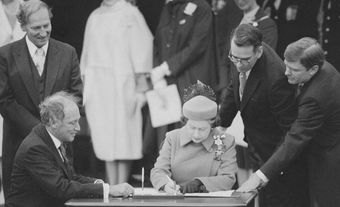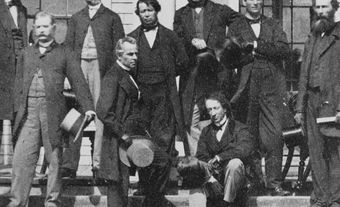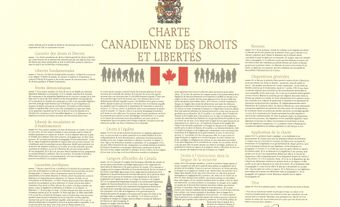
The King-Byng Affair was a 1926 Canadian constitutional crisis pitting the powers of a prime minister against the powers of a governor general. It began when Prime Minister William Lyon Mackenzie King asked Governor General Lord Julian Byng of Vimy to dissolve Parliament and call fresh elections. Byng refused. It ended with King winning an eventual election, and no governor general ever again publicly refusing the advice of a prime minister.
King's Minority Government
The affair began with the 29 October 1925 federal election which returned 101 Liberals, 116 Conservatives and 28 Progressives, Labour and Independents to Parliament. King, the Liberal leader and prime minister of the previous Parliament, declined to turn power over to the Conservatives but instead met with the House of Commons to let Parliament decide who should govern, as was his right. The new House, largely due to the support of the Progressives, backed the minority Liberal government. Their support lasted until 25 June 1926, when Parliament defeated a motion to remove censure from a no confidence motion against the King government.
Before that happened, however, King asked the governor general to dissolve Parliament and call fresh elections. Byng declined King's advice. A request for dissolution while a motion of censure was under debate was unprecedented. Byng instead asked the opposition Conservatives—the largest single party in the House—to form a government under Arthur Meighen.
Meighen Becomes Prime Minister
King resigned and informed Parliament he was no longer prime minister. Arthur Meighen and his Conservatives formed a minority government. At the time, if a Member of Parliament was appointed to a cabinet post he had to resign his seat and seek re-election in a by-election. But Meighen did not take this approach. He gave up his own seat, but named fellow Conservatives as acting ministers, or ministers without portfolio, meaning, in his view, that they did not need to resign. King and the Liberals argued he was wrong: if the new ministers were to legally run their departments, they must first resign; if they did not hold office legally, then they had no right to govern.
The Conservatives held onto the government through four successful parliamentary votes, including one to censure the previous King government, but they lost a fifth vote. Meighen asked Byng for a dissolution and an election. Byng granted his request.
King Wins 1926 Election
The election was called for 14 September 1926. Meighen campaigned by accusing the Liberals of corruption and maladministration. King ran largely on the constitutional issue; what he framed as the interference by a British governor general with the rights of Canadians to govern themselves. In his diary on 2 July, he had written that “I could not believe [Byng] would deliver himself so completely into my hands." Later, he noted that the “great issue . . . that the people will respond to . . . is the making of our nation."
Out of 245 House seats, King’s Liberals took a majority of 128 seats to the Tories' 91. The Progressives and others had 26 seats. The Liberals would govern until the 1930 election.
Constitutional Reform
The King-Byng Affair played a role in the Imperial Conference of 1926, which began to put legal substance behind the Balfour Report declaration that Britain and the Dominions were constitutionally "equal in status." It was followed by the 1929 Conference on the Operation of Dominion Legislation and the Imperial Conference of 1930, which continued the effort to find common ground on making fundamental changes in the Commonwealth's complicated legal system.
The Statute of Westminster was passed by the British Parliament on 11 December 1931. The statute was requested by Canada and the other Dominions (Australia, New Zealand and South Africa). It clarified the powers of Dominion parliaments and granted the Dominions full legal freedom except in those areas where they chose to remain subordinate. Canadian governors general would hereafter always follow the advice of the Canadian prime minister.

 Share on Facebook
Share on Facebook Share on X
Share on X Share by Email
Share by Email Share on Google Classroom
Share on Google Classroom


